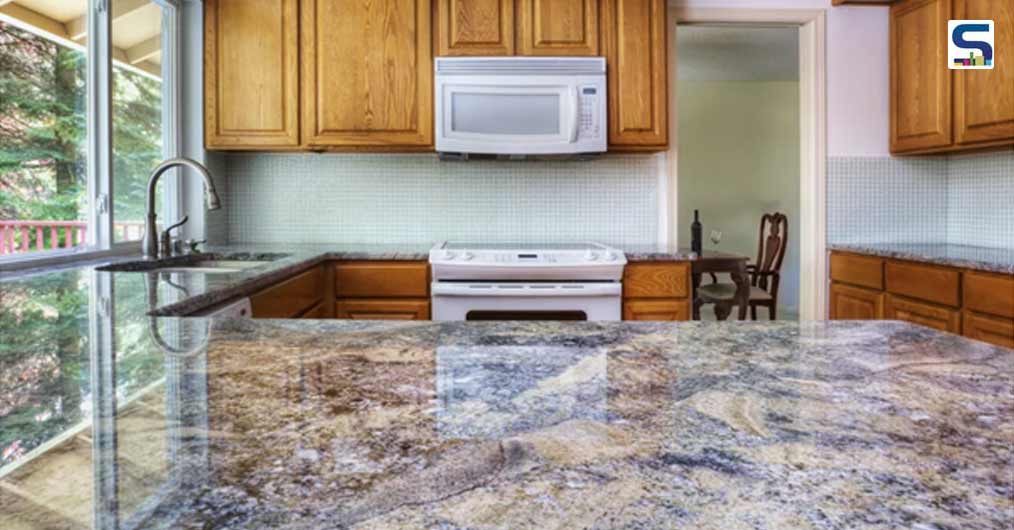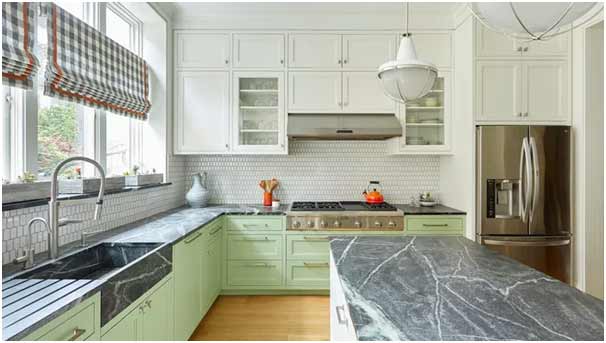
Stone countertops can enhance the look of your kitchen by making them look more expensive. Countertops of concrete, granite, limestone, marble, quartz, or soapstone are an excellent choice for durability. Although there is no doubt about the durability of these stones, it is imperative to understand how to care for them properly. This will prevent untimely damage to your favorite countertop. Natural stone countertops must be prevented from hot pots, pans, and dishes of food. Excessive heat can lead to a thermal shock which may crack natural stones. Using a trivet might not be a difficult task, but many users are not aware of the same. This is why Surfaces Reporter(SR) tells you about the cleaning process of each of these stones.
Concrete
Concrete might not immediately feel like natural stone. The reality is that concrete is a mixture of finely crushed stone, sand, cement, and water. For stain removal from the durable solid surface, you need to use chlorine bleach carefully. Wet cotton or a white paper towel in the bleach and apply it directly to the stain. Let it stay on for five to ten minutes and cool with plain water. Avoid leaving it for longer hours. To remove oil stains use baking soda and acetone (fingernail polish remover) to form a thick paste. Now spread it over the stain and cover the area with plastic and leave for 24 hours. Now wipe with a micro cloth.

Granite
For cleaning tough stains off granite you need a commercial stone poultice. You can create a mixture of baking soda and hydrogen peroxide to form a thick paste to replicate the function of the commercial stone poultice. You can leave the stained area in a similar way as for concrete. Cover it with plastic and leave it for 24 hours. Remove the plastic and wipe it off. For daily cleaning, you can use dishwashing detergent and water.

Limestone
Limestones are a more affordable version of marbles which makes them a bit more vulnerable. It can be sensitive to excessive heat, which can lead to burns or scorches. To clean stains, make use of baking soda and hydrogen peroxide into a thick paste. Leave it for a day under a plastic sheet. For milder stains, you can buff them out with 0000-grade fine steel wool. Additionally, you can use a bit of car polishing compound too. Make sure to reseal the area after cleaning.
Marble
Marble can be kept free of stains using mild dish detergent and warm water. For food or rust marks on your marble, create a paste of baking soda and hydrogen peroxide. Apply the paste generously and let it dry, before wiping it away. For getting rid of scratches and etching use a marble polishing powder. Remember to be gentle with marble as over scrubbing can leave scratches over it. Avoid acidic compounds such as lemon juices as it forms calcite compounds, which will spoil the marble's consistency.

Quartz
Quartz is a tough material and does not require too much maintenance. For regular cleaning, you can use a glass cleaner or any non-abrasive household cleaner. Avoid using abrasive cleaners, or scouring pads. To remove nail polish stains or paints you can make use of a plastic putty knife.

Soapstone
Soapstone becomes darker as it is exposed to water and oils. To clean this stone for daily maintenance, use any household cleaner and water. Do not use scouring powders and pads. For clearing the scratches you can rub the area with mineral oil. It will also remove the discoloring caused by hard water spotting.
Conclusion
Other than cleaning and prevention, you need to reseal the stone to prevent wear and tear. Always read the chemical ingredients of any new cleaning agent that you may want to use as it might react with the stone. Another tip would be to avoid harsh chemicals.
Title Image: Kazé, Bengaluru